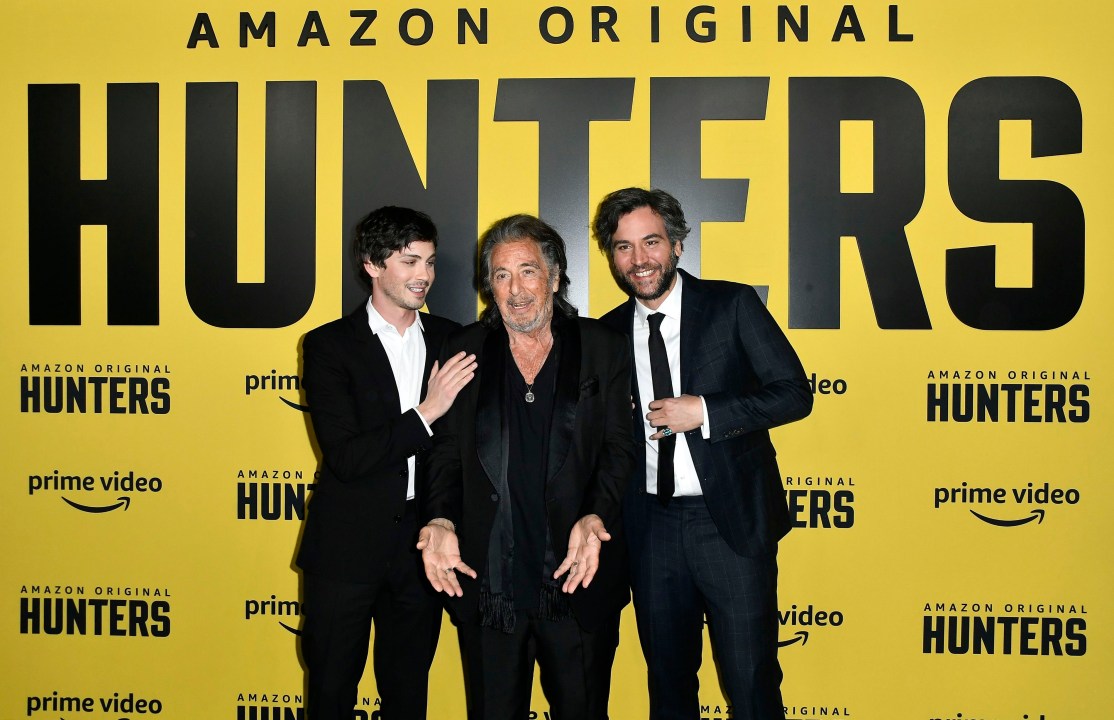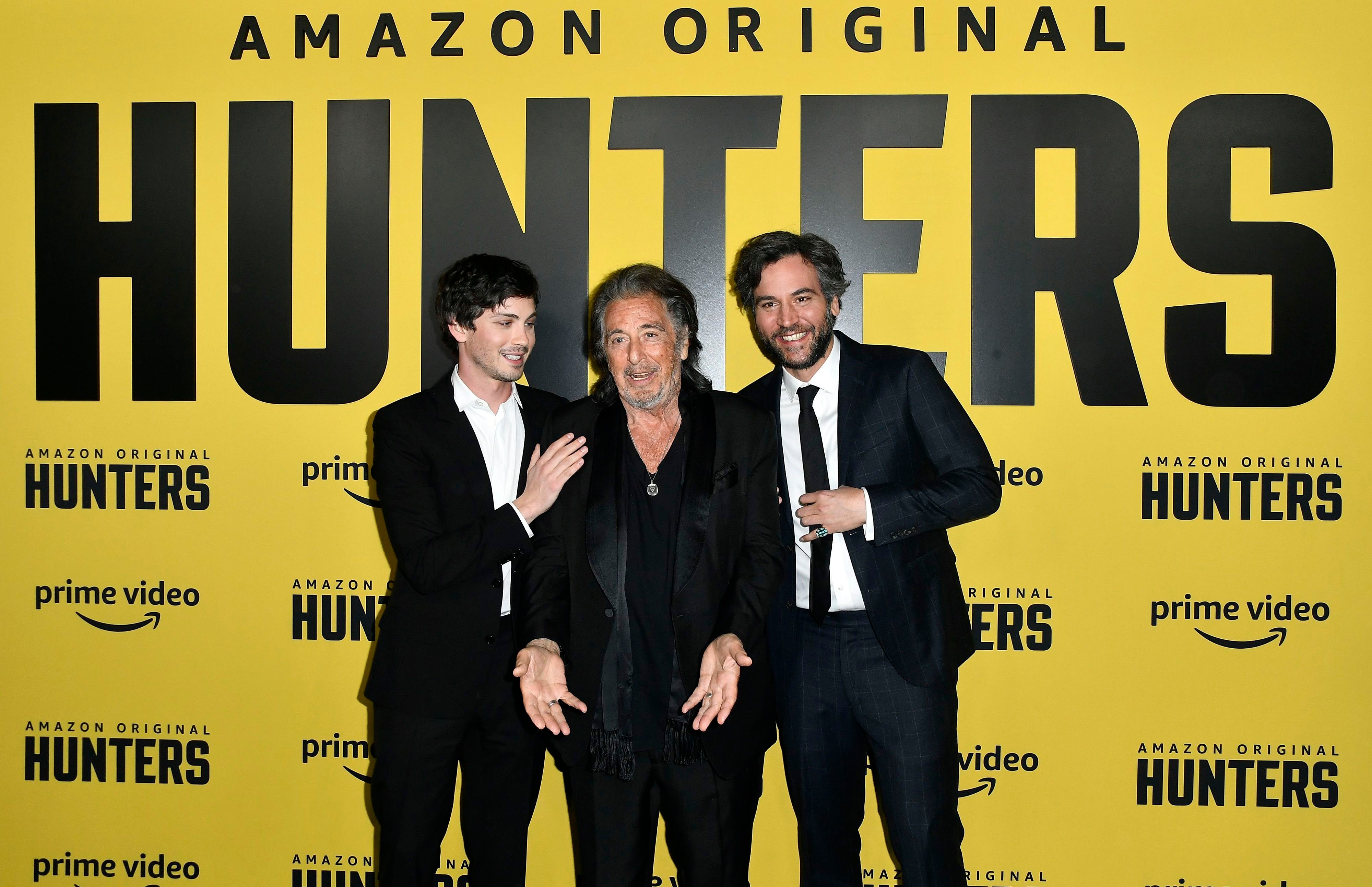What a brilliant idea the concept of Hunters (Amazon Prime) must have sounded after the third or fourth Martini.
“So, like, it’s set in the 1970s and America is swarming with Nazis. Actual Nazis. They’ve infiltrated every level of society and they’re totally evil and powerful, like vampires with swastikas. And all that stands in their way to create a Fourth Reich is a plucky band of diverse Nazi-hunters, led by a Bruce-Wayne-style concentration camp survivor and billionaire played by Al Pacino!”
But then, after the hangovers kicked in, wiser counsels ought to have prevailed. Someone might have pointed out that, with the Holocaust still within living memory, maybe it’s a bit too soon to turn the subject into schlocky superhero revenge porn for Generation Z. Then someone else might have started asking hard questions like: “OK. So how exactly did so many Nazis sneak into the US unnoticed? How, if they’re so damned good at this stuff, did they fail to win the war? How, without massed panzer divisions, Stuka squadrons, and Blitzkrieg could a bunch of sleeper agents, however numerous, pose any kind of threat to Western civilisation?”
Instead, astonishingly, the production was green-lit and the result is possibly the crassest, most intelligence-insulting and ridiculous series you’ll find anywhere on TV this year.
One of the more excruciating moments which has attracted criticism is a fictitious flashback scene, set at Auschwitz, where a sadistic Nazi stages a series of chess matches on a life-sized board with concentration camp inmates playing the role of pieces. Each time a piece is taken off the board, the inmate is killed.
As a titillating exercise in sick, grand-guignol horror, this could work perfectly well if, say, a James Bond baddie were to do this on one of his volcano island lairs. In the right film, it would make for some pretty effective cinema (and a refreshing break from the franchise’s near-relentless PC). But Auschwitz was real. An estimated 1.1 million real people died there – none of them on pretend chess boards, but in ways at least as grisly and sadistic. Are we sure that the torture, beatings and executions that actually took place there needed exaggerating in order to make the horror of the Holocaust feel more relevant?
Not only does this do a disservice to the victims of the Holocaust but, more dangerously, it misrepresents the nature of the ideology that brought it about. The Nazis depicted in Hunters are the Nazis that Heinrich Himmler might have willed them to be in his darkest fantasies: ruthless, strong, indomitable, and closer to being comic book supervillains than real people. We see this in the opening sequence (spoiler alert) when a closet Nazi – who has been hanging out all these years in America, working his way up to senator (as any ambitious Nazi mole would) – is suddenly rumbled. Naturally the first thing he does, being a Nazi, is to shoot his wife and children. “All along I’ve wanted to snap their little necks,” he explains.
Really? How does that work then? I can see that it establishes the Nazi moles as deeply unpleasant villains that you very much want Pacino and his Oceans 11 style team of diverse avengers (a nun, a black power activist, etc) to kill. But at the same time, it renders them so cartoonishly evil, so motiveless and malignant that you cease to take them seriously as credible human beings. They might as well be aliens, or werewolves or replicants. They bear no plausible relation to the mostly quite ordinary Germans – and their ordinariness, surely, is the shocking part – who found themselves capable of murdering six million Jews, gipsies, homosexuals, and disabled people.
As history recedes, it is of course inevitable that newer generations who’ve never been exposed to Primo Levi or Vasily Grossman (or who have grown up in the shadow of the war) are going to treat older generations’ sacred cows with less and less reverence. The series producer David Weil – whose grandmother was a Holocaust survivor – has justified the made-up chess sequence by claiming that he did not want to depict ‘specific, real acts of trauma’. He says: “If the larger philosophical question is, can we ever tell stories about the Holocaust that are not documentary? I believe we can and should.”
I agree. But it’s only worth taking these risks if the resulting product is good art. Hunters, though, is dreadful art. Wildly inconsistent in mood and tone; clichéd; ludicrously implausible; clunky; amateurish. Hunters is so bad I wouldn’t have made it even to the end of episode one if I hadn’t been reviewing it.
There’s a scene, for example, where the young Jewish hero Jonah Heidelberg (Logan Lerman) breaks down in a restaurant because the chicken soup isn’t a patch on the chicken soup his recently murdered Jewish ex-concentration camp grandmother used to make him. Mere description doesn’t do justice to the breathtaking crassness of this scene, and indeed the series’ heavy-handed treatment of Jewish culture generally. It’s as if Hunters was written for an audience which has never once seen a Woody Allen film or eaten salt beef in Katz’s deli or even heard of the Old Testament; as if Judaism and Jewishness and Jews are so remote from this modern world of ours that the only way to present them is as if they were in some Ye Olde Jewish Theme Park.
Obviously I shan’t be watching any further. I really wish no one else did either, especially all those impressionable kids who’ve been brainwashed by groups like Antifa into believing that Nazis really do still walk among us and that because they are ‘Nazis’ therefore that very label justifies any violence that might be used against them. I partly blame Quentin Tarantino, who introduced this glib, dangerous trope into the screen lexicon with his vile and stupid Inglourious Basterds. Hunters, though, sets the bar lower still. Avoid.








Comments